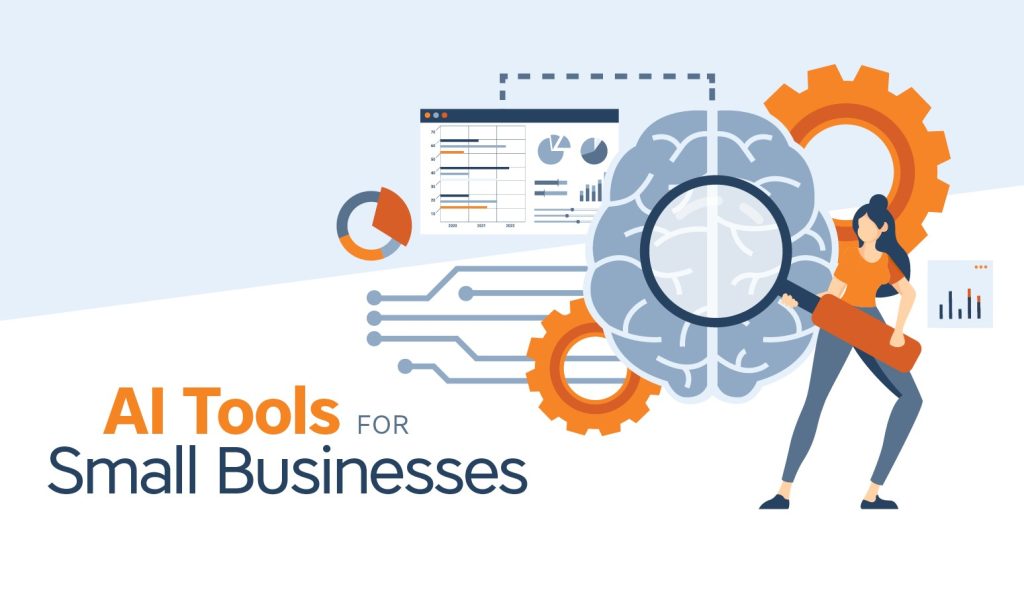Artificial intelligence (AI) is no longer just a tool for large corporations with deep pockets. AI tools are now accessible and highly beneficial for small businesses. They offer a range of solutions tailored to their unique needs. From improving operational efficiency to personalizing customer interactions and optimizing marketing efforts, AI can significantly enhance various aspects of a small business. Below we’ll explain how AI tools can transform small business operations, providing a competitive edge in an increasingly tech-driven marketplace. We’ll go into specific AI applications, examining their cost-benefit analysis, real-world success stories, and the latest trends that will shape the future of small businesses.
Overview of AI Tools for Efficiency
AI tools for small businesses are revolutionizing the way entrepreneurs manage their operations. This is leading to significant improvements in efficiency and productivity. One of the most impactful applications is automated scheduling systems. These tools eliminate the need for manual appointment setting and resource allocation, thereby reducing errors and saving time. By automating these processes, businesses can ensure a more efficient use of their resources. This allows staff to focus on higher-value tasks.
Furthermore, customer service chatbots have become indispensable in enhancing customer interactions. These AI-driven assistants provide immediate responses to customer inquiries, regardless of the time of day. This not only improves customer satisfaction by ensuring constant availability but also reduces the workload on human employees. Chatbots can handle a vast range of queries, from simple product questions to more complex service issues. They streamline customer service operations significantly.
Inventory management systems, enhanced by AI, also play a crucial role in optimizing business operations. These systems use predictive analytics to forecast demand and adjust stock levels accordingly. This precision prevents both overstocking and stockouts. It also maintains the right balance to meet customer demand without tying up capital in excess inventory. As a result, businesses can minimize costs associated with unsold goods and lost sales, ensuring a smoother operational flow.
By integrating these AI tools, small businesses not only reduce manual tasks but also enhance their overall productivity. The automation of routine and time-consuming tasks frees up business owners and their employees to concentrate on growth and improving customer relationships. This strategic shift towards leveraging technology allows small enterprises to compete more effectively in today’s fast-paced market.
Cost-Benefit Analysis
Implementing AI tools for small businesses requires an initial investment that varies depending on the tool’s complexity and scope. However, this cost is often offset by the significant return on investment (ROI) these tools can deliver. For instance, AI-driven analytics can enhance decision-making and operational efficiency, leading to reduced operational costs and increased revenue.
Additionally, the comparison between AI tools and traditional methods reveals considerable advantages. Traditional processes, often manual and time-consuming, limit the potential for scaling. This can lead to higher long-term costs due to inefficiencies. Conversely, AI tools automate these processes, reducing labor costs and error rates. Moreover, the precision and speed of AI systems typically result in a faster turnaround, enhancing customer satisfaction and retention.
Therefore, while the upfront cost of AI tools may seem daunting, the long-term benefits—such as improved efficiency, reduced errors, and better customer engagement—can justify the investment. Business owners should consider these factors when evaluating the financial implications of adopting AI technologies.
Case Studies and Success Stories
One notable example of the successful implementation of AI tools for small businesses is a boutique retail store that struggled with inventory management. The store frequently experienced overstock and understock issues, which impacted their profitability. By integrating an AI-driven inventory management system, they were able to optimize their stock levels based on real-time data and predictive analytics. Consequently, this significantly reduced excess inventory costs and increased customer satisfaction by ensuring popular items were always in stock.
Furthermore, a small online marketing firm faced challenges in understanding and predicting customer behavior. They adopted AI tools to analyze customer data and personalize marketing strategies. As a result, the firm saw a substantial increase in engagement rates and a higher conversion rate, demonstrating the potent impact of targeted marketing facilitated by AI.
Additionally, a local bakery utilized AI to enhance its customer service. Implementing a chatbot on their website allowed for round-the-clock customer interaction, addressing queries and taking orders without human intervention. This not only improved customer service efficiency but also boosted sales, as the chatbot could handle multiple customers simultaneously, reducing wait times and enhancing the overall customer experience.
These case studies exemplify how small businesses across various industries can leverage AI tools to overcome operational challenges, enhance efficiency, and drive business growth. By embracing these technologies, small enterprises are not only solving immediate problems but also positioning themselves for long-term success.
Marketing and Customer Insights
AI tools for small businesses are transforming marketing strategies by providing deep insights into customer behavior. Platforms equipped with AI-driven analytics enable businesses to gather and analyze vast amounts of data, revealing patterns that were previously unnoticed. Consequently, these insights allow for the personalization of marketing efforts, ensuring that messages resonate more effectively with targeted audiences.
Additionally, AI tools facilitate advanced customer segmentation. By dividing customers into precise groups based on behavior, preferences, or demographic details, businesses can tailor their offerings and communications. This targeted approach not only enhances customer engagement but also significantly improves the efficiency of marketing budgets. Moreover, it increases the likelihood of converting prospects into loyal customers.
Predictive analytics is another powerful feature of these AI platforms. It helps businesses anticipate future sales trends based on historical data and market conditions. As a result, companies can adjust their marketing and inventory strategies proactively, staying ahead of both demand curves and competition.
Through these sophisticated AI capabilities, small businesses can achieve a competitive edge, driving growth and customer satisfaction in an increasingly digital marketplace. The use of AI not only optimizes marketing efforts but also streamlines operations and enhances overall business resilience.
Future Trends and Innovations in AI for Small Business
Emerging AI technologies and trends are poised to significantly impact the landscape for small businesses. As AI tools for small businesses evolve, they promise to bring even more sophisticated solutions that can revolutionize how small enterprises operate. For instance, advancements in natural language processing (NLP) could lead to more intuitive customer service bots that understand and respond to complex queries with higher accuracy.
Furthermore, AI is increasingly integrating with the Internet of Things (IoT), enabling small businesses to automate and monitor physical environments in unprecedented ways. This synergy can enhance operational efficiencies, such as optimizing energy use or streamlining supply chains. Consequently, small businesses will be able to reduce costs and improve sustainability.
Additionally, the rise of AI-driven decision-making tools offers small businesses the ability to make informed decisions quickly. These tools analyze data in real-time, providing insights that help businesses adapt to market changes more dynamically. Therefore, staying abreast of these AI developments is crucial for small businesses aiming to maintain a competitive edge.
To capitalize on these opportunities, small business owners should invest in training and development to ensure their teams are equipped to implement and manage these new technologies. Preparing for future integrations involves not only understanding the potential of AI but also being ready to adapt business models to leverage these powerful tools effectively. By doing so, small businesses can position themselves to thrive in an increasingly digital and automated business environment.
Conclusion
In conclusion, AI tools offer transformative potential for small businesses, streamlining operations, enhancing customer engagement, and providing crucial insights into market trends. As these technologies continue to evolve, the ability of small businesses to adapt and integrate AI into their operations will increasingly become a determinant of their success and sustainability. Small business owners should therefore prioritize understanding and implementing AI tools to not only solve immediate challenges but also to strategically position themselves for future opportunities. Embracing AI is not merely about keeping up with technological advances—it’s about seizing the opportunity to redefine what’s possible for small businesses in a digital-first world.



